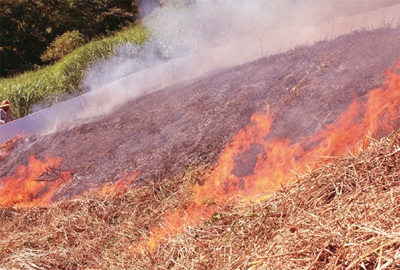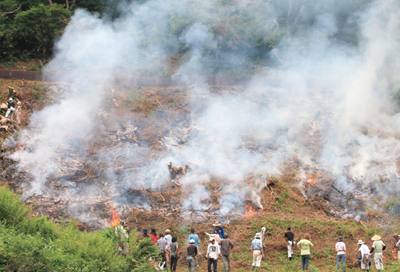Project Leader:SUZUKI, Reiji (Faculty of Bio-environment, Kyoto Gakuen University)
Collaborators:KURODA,Suehisa (School of Human Cultures, The University of Shiga Prefecture)
MASUDA, Kazuya (Center for Southeast Asian Studies, Kyoto University)
ANDO, Kazuo (Center for Southeast Asian Studies, Kyoto University)
Term:2012-2013
Outline of Research:

Burning of grass land in Yogo town. The fire gradually came down from the upper slope and soil was well burned.
Traditional swidden cultivation is not a primitive and environmentally destructive form of agriculture. It is a rational and sustainable agriculture system in which forest recovery after slash-and-burn and crop production is well harmonized under long fallow period. This studywill reconstruct local knowledge and skills inherited in Japanese traditional swidden agriculture through a bibliographical survey, participant observation and interviews to examine the potential of swidden as a form of environmentally sustainable agriculture in intermediate and mountainous areas of Japan. The various outcomes of previous studies on swidden in Southeast Asian countries will also be reviewed for comparative discussion. The goal of this study is to present fundamental data for building up a lifestyle model toward a society that recycles and is fossil fuel independent.
Description:

Burning of scrub forest in Yogo town. Participants looking up from the lower end of the slope after the burning.
To overcome various problems which became obvious in recent consumer orientated society, both the innovation of cutting-edge science and technology and learning from knowledge and skill inherited through traditional human livelihood is important. In this study, we will examine the contemporary significance of Japanese swidden agriculture as a form of environmentally sustainable agriculture in intermediate and mountainous areas of Japan. In some areas of Japan, local people still engage in traditional swidden cultivation. However, most of these people are of an advanced age and there are few successors to continue their practices. Both academically and practically it is important to record their knowledge and skills before Japanese swidden agriculture disappears.
Through fundamental data accumulated through a bibliographical survey, participant observation and interviews, this research will collect information which can be used toward building up a lifestyle model toward a society that recycles and is fossil fuel independent.
